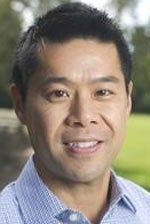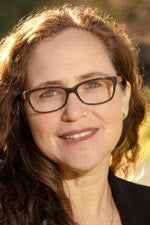UC Davis LIVE last week discussed COVID-19 and education, covering topics including distance learning, how the pandemic has exacerbated existing inequalities and student learning loss.
The Feb. 25 program used a question-and-answer format, with answers coming from two School of Education professors. Michal Kurlaender, department chair, largely talked about the experiences of college students while Kevin Gee, affiliated with the Center for Poverty Research, focused on kindergarten-through-12th-grade students.
FROM UC DAVIS HEALTH
Kurlaender discussed the results of a survey of 76,000 college students she helped conduct last May in a joint effort between the California Education Lab at UC Davis and the California Student Aid Commission. The majority of surveyed students had lost some or all of their income, she said. Most were still planning to continue on with their education plans, but many were unsure about their ability to succeed in distance learning.
Nationally, Kurlaender said, college enrollment is declining, and at a disproportionate rate among community college students, students finishing high school and students from low-income backgrounds. Many students described the challenge of supporting their families while trying to study in survey responses, she said.
“They clearly have an intention to pursue their educational goals, but are perhaps experiencing a lot of struggles to get there,” Kurlaender said
Another survey of 100,000 students was carried out in Fall 2020, she said, but the results are still being analyzed.
Learning loss

Gee said the concept of learning loss — the amount of learning that’s happening during the pandemic compared to pre-pandemic — immediately comes to mind when trying to describe how K-12 students have handled school over the past year. Additionally, he said, there’s been plenty of anecdotal evidence that mental and physical health is a major concern.
“They’re feeling a bit disconnected, they want to be with their friends, levels of anxiety and depression I think are definitely on their minds,” Gee said. “We know that schools serve more than an academic purpose, so we want to be thinking about the kind of supports that schools need to be providing to look after the socio-emotional well-being of our students.”
Gee said it’s not really known yet what learning loss looks like during the current academic year, but, if this year is anything like last year, learning loss is expected. He brought up a recent report from Policy Analysis for California Education that found learning losses in English language arts and in math after analyzing data from 18 districts and 50,000 students from fourth to 10th grade.
The learning losses tend to be concentrated in earlier grades, Gee said, and are more pronounced among California’s most disadvantaged groups.
“If we just look at fifth-grade English-language learners, their losses are nearly 30 percent of the typical gains they would have made.”’
Stable environment

Responding to a question about what’s been learned about distance learning in the past year, Kurlaender said it’s been effective for some students, but the effectiveness depends on stability in the student’s learning environment, which can be destabilized by food insecurity, health issues, or internet connectivity problems, among many other reasons.
Gee said the human connection aspect of teaching is much more difficult in distance learning than it was in pre-pandemic in-person schooling.
“We know that connecting with adults matters, we know that connecting with peers matters, that’s how kids get socialized,” Gee said. “That’s extremely difficult over a remote platform. I like to read the room when I teach. I like to look at reactions and faces and now we’re in a world where it’s tough to do that.”
Kurlaender added that school districts and colleges need to wrestle with how the pandemic has exacerbated existing inequalities when transitioning back to in-person learning.
“We are going to face many decades of exacerbated inequalities if we don’t address this now,” Kurlaender said.
Reposted with permission of The Davis Enterprise.
The next UC Davis LIVE
Clare Cannon, assistant professor of social and environmental justice in the Department of Human Ecology, recently co-authored a study on intimate partner violence during the pandemic, and she will discuss her research on the next edition of UC Davis LIVE, 1 p.m. Thursday, March 11. Find the link on the UC Davis Facebook events page.